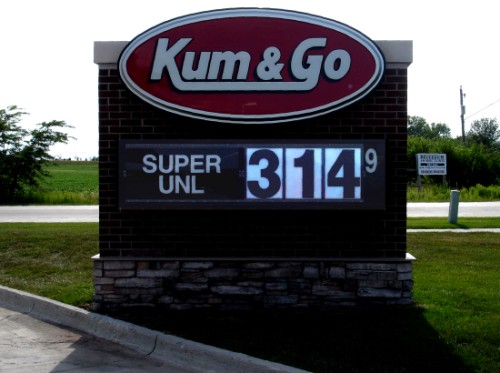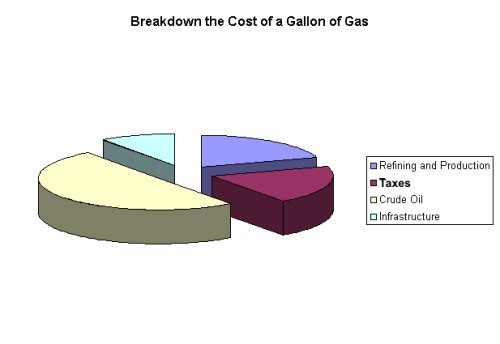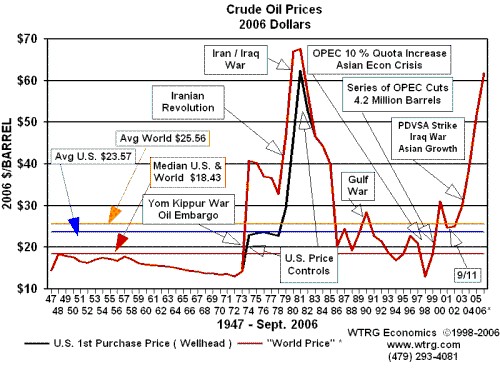I'm tired of this.  Tamara and I have driven across the country three times this year, and we have at least two more trips in front of us, and that's driving when fuel economy is most economical: on the highway. That's not to mention driving in town daily at lower MPG. Given this expensive state of affairs, I wanted to learn more about why gas prices are as they are and where that money goes. Caveat: I'm no expert. I'm trying to piece it together from multiple sources... if you see an error, correct me where I'm wrong. But I'll give you what I can discern. Consider this learning out loud. First, it's not easy to learn how the price of a gallon of gas breaks down.  I'm basing my breakdown on this report from Chicago Public Radio. So to translate, about 50 percent of the price of a gallon is the cost of crude oil, 20 percent is refining and production, 10 percent is infrastructure and 20 percent is taxes. 20% goes to taxes. That's 63¢ at $3.14 per gallon. And what exactly does the government do to produce gas? It doesn't.Yes, some of that money goes toward road maintenance. But think about it. If you fill up two to three times in a month, for both vehicles, as my family does, that's about $75 a month in taxes, or close to $1,000 a year. (I need to do a post in the future on the multiple places we're taxed... I recently wanted to install a home phone, since we're all on cell phones now, and learned that there's a flat $15 a month tax on a home phone, plus usage tax. My $50 a month home phone became a $70 a month purchase because of taxes. I cancelled the order.) So now you know about taxes at the pump. The next time politicians bemoan oil company profits ask them about taxes. At least oil companies actually do something to put gas in the pump. Politicians just skim. That pump price shown above would be $2.51 if it weren't for the "because I can" money grab by politicians. Imagine a world without 20% gas taxes... let's halve it to 10%, which is still more than sales tax alone. We're down to $2.83 per gallon. I hear a lot about refining capacity. What's that all about? An oil refinery takes oil crude - what comes straight from the earth - and turns it into usable gasoline. We need those. Refining capacity is how well and how much we crank out gasoline at refineries. The more we put out, the greater supply of gas there is. You've heard of supply and demand? The more supply, the lower the price? Well, we have a problem here. This report, from the Department of Energy, shows that in 1982 there were 263 refineries. In 2002, there were 159. And today, only 150. I hear from right-wing media all the time how it's the environmentalists who aren't allowing more refineries to be built. Um, okay... that might be true to some degree. But isn't it easier to simply maintain what you already have permission to have - an existing refinery - than to get permission to built from scratch? We've dropped 113 refineries in 25 years. That's a reduction of 43%. Environmentalists didn't do that. Each of those was a business decision by an oil company. Now, if what I produce is in high demand and getting more in demand all the time, and I can restrict the supply to make my production more valuable, why, that's just good business. Each refinery becomes more profitable. "More with less." Sound familiar? During this decline in the number of refineries, technology helped them get more efficient. The 263 operating refineries in 1982 distilled 17,618,872 barrels of oil per day. The 159 operating refineries in 2002 distilled 17,177,371 barrels of oil per day. While that's close to the same output, it's a half million barrels fewer. And yet, demand has gone up. I'll bet they're laughing all the way to the bank. Less expense, more profit. Right-wing media appear to be dupes who haven't done their homework when they blame it only on environmentalists. (I haven't looked at why they closed, but I seriously doubt these facilities closed due to environmentalist pressures.) So I can see that refineries are about 40% more efficient than they once were. If all of these were still operating, and if supply were that much more efficient, gas prices would be reduced. This guy says without source that "refiner's margins have gone from $.40 a gallon to $.80 over the last year." Let's make that assumption. Imagine a world without refinery shut downs... subtracting 40¢ from gas prices, we're down to $2.43 per gallon, and the oil companies still profit 40¢ a gallon. Sounds fair to me. Ethanol is a problem. Because laws demand an additive to make gas that burns cleaner, ethanol is the only readily available additive now that MTBE is out of the picture. And ethanol might be responsible for giving oil industry execs an excuse to scale back refinery expansions. Oil industry executives no longer believe there will be the demand for gasoline over the next decade to warrant the billions of dollars in refinery expansions - as much as 10 percent increase in new refining capacity - they anticipated as recently as a year ago. Nice. And then there's this, which says that ethanol gets a 51-cent per gallon government subsidy from you, the taxpayer. And ADM, the largest ethanol manufacturer, projects earnings to grow by 46% this year.I don't even know how to subtract that out, but let's just say that ethanol is making our lives more expensive. So what about crude oil prices?  We see that war in Iran or Iraq makes them spike and spike big. Now I happen to believe that we did the right thing in going into Iraq. But the mismanagement of the war certainly made it last longer, and that keeps crude prices higher longer. Purposeful? Never ascribe to malice what can be explained by stupidity. Let's finish the fight and go home (link via Glenn Reynolds). If crude is half the cost of gas at the pump, and if we can get prices back to even $35 a barrel, that's roughly a 75¢ reduction in gas prices. All totalled, in my imaginary world, gas is then $1.68 at the pump. That's livable and easier to swallow. |